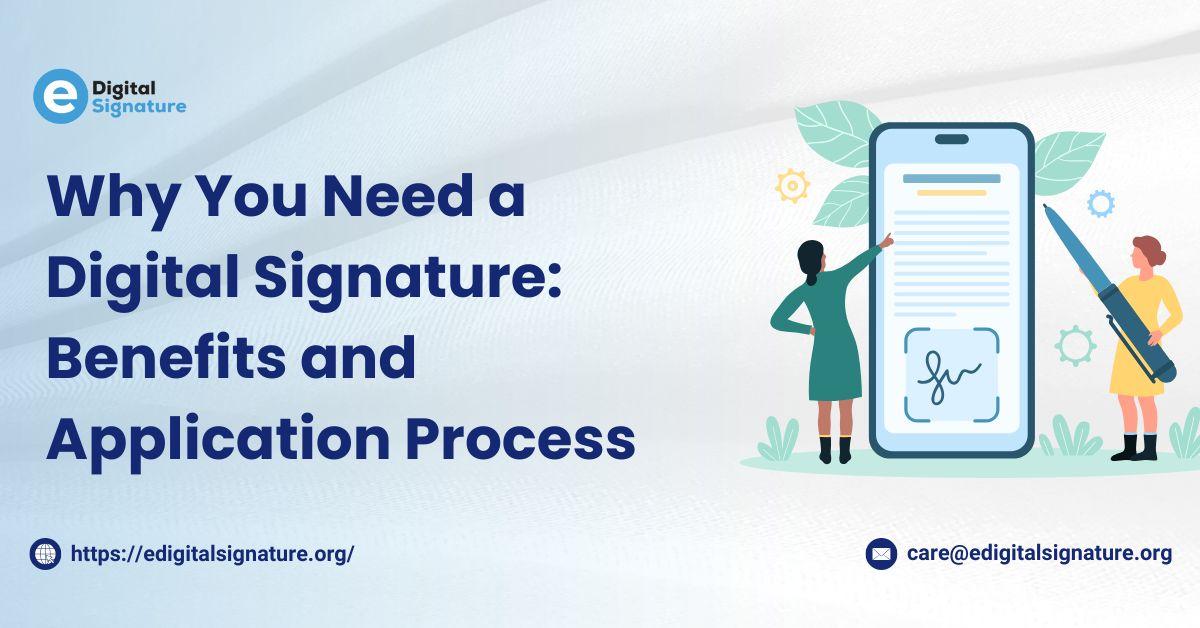Notifications

8 minutes, 20 seconds
-328 Views 0 Comments 0 Likes 0 Reviews

In the digital age, the importance of online security and authentication cannot be overstated. As businesses and individuals shift their operations to the online world, ensuring the authenticity, integrity, and confidentiality of digital communications and transactions is crucial. One of the most effective tools to achieve this is a digital signature. A digital signature serves as an electronic equivalent of a handwritten signature but with far more robust security. It is used to verify the identity of the sender of a message or document and ensure that the content hasn’t been altered in transit. In this blog, we will explore why you need a digital signature its benefits, and how to apply for one.
A digital signature is a cryptographic mechanism used to authenticate the identity of the sender and ensure the integrity of a document or message. It uses a pair of keys: a private key and a public key.
The private key is securely held by the signer and is used to sign documents or messages.
The public key is shared with the recipient and is used to verify that the signature matches the signer’s private key.
Digital signatures are a key element of Public Key Infrastructure (PKI), a framework used to secure online communications.
With businesses and individuals increasingly relying on electronic transactions, a digital signature offers several advantages over traditional, paper-based methods. Below are some of the reasons why you need a digital signature:
Digital signatures enhance security by using encryption to protect documents and verify the identity of the signer. They offer two key benefits:
Authentication: Verifies the signer’s identity.
Data Integrity: Ensures the document remains unchanged after signing.
Any attempt to alter the signed document would invalidate the signature, reducing the risk of fraud and tampering.
Digital signatures are legally recognized under the Information Technology Act, 2000 in India, making them equivalent to handwritten signatures. This legal recognition ensures that digital signatures are valid for contracts, agreements, government forms, and e-commerce transactions, holding up in court as legally binding.
Digital signatures streamline the signing process by eliminating the need for printing, scanning, and mailing documents. This makes document handling faster and more efficient, saving both time and money for businesses. By reducing administrative costs and speeding up document processing, businesses can improve productivity and meet deadlines more effectively.
Digital signatures build trust by ensuring the authenticity and integrity of documents. They help protect against fraud and identity theft, offering reassurance to clients and customers that your business is legitimate. For businesses handling sensitive information or financial transactions, digital signatures show a commitment to security and data protection.
Digital signatures are essential for global business, allowing secure and verified document signing across borders. Using public key infrastructure (PKI), they enable seamless transactions with international clients, suppliers, and regulatory bodies. This is crucial for cross-border contracts, legal agreements, and trade documentation, ensuring smooth and secure global operations.
Digital signatures are user-friendly and can be easily integrated into everyday business operations. You don’t need to be an IT expert to use a digital signature. The process typically involves uploading a document, applying the digital signature through a certificate issued by a trusted certification authority (CA), and sending it to the recipient. Many platforms, including e-mail services and document management systems, support the use of digital signatures, making it even easier to adopt.
To summarize, here are the key benefits of using a digital signature:
Improved Security: It prevents unauthorized access and alterations.
Legally Binding: It’s recognized as a valid signature under the law.
Cost and Time-Efficiency: It reduces administrative and operational costs.
Increased Trust: This adds credibility to your business or communications.
International Acceptance: This facilitates global transactions and agreements.
Ease of Use: It is Simple to implement.
Go to our official website to begin the application process.
User Type: Select whether you are an individual or representing an organization.
Certificate Type: Choose between a signing-only certificate or one for both signing and encryption.
Validity: Decide the duration of your certificate.
Personal Information: Provide your name and contact details (phone number, email, and address).
Agree to Terms: Tick the box to accept the terms and conditions.
Submit: Hit the submit button to proceed.
Have a USB Token?: If you already have a token, choose “No.” If you need a new one, select “Yes.”
Payment Details: Enter your payment information (net banking, credit card, debit card, or UPI) and complete the transaction.
Double-check that all details are correct.
Submit: Click submit and wait for the confirmation email.
Once processed, your digital signature will be sent to you on a USB token drive.
Suggested Read- Class 3 digital signature
A digital signature is a vital tool in today’s fast-paced digital world, providing enhanced security, legal validity, and increased trust. Whether you're an individual or a business, the adoption of digital signatures can streamline your processes, reduce costs, and help you stay compliant with legal and regulatory requirements. By using a digital signature, you can safeguard your documents, reduce the risk of fraud, and establish a more trustworthy online presence. As digital transactions become more common, having a digital signature is no longer just a convenience—it’s a necessity. If you haven't yet adopted this secure method of signing documents, it's time to get started and take advantage of the many benefits digital signatures offer.

